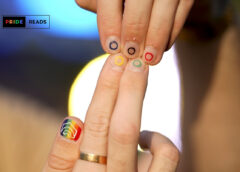
A Landmark Moment for LGBTQ+ Representation
The Paris 2024 Olympics have made history by featuring 191 openly LGBTQ+ athletes, surpassing the previous record of 186 athletes set at the COVID-19-delayed Tokyo Olympics in 2021. This milestone marks a significant stride in the inclusivity of international sports, highlighting the progress made over the years and the ongoing efforts to create a more accepting environment for all athletes.
The Journey of Charline Van Snick
Charline Van Snick, a retired Belgian Olympian, recalled the challenges she faced after winning a bronze medal in Judo at the 2012 London Olympic Games. Her coach advised her to stay in the closet, stating that being openly LGBTQ+ could hinder her career. Van Snick’s experience underscores the cultural shift within the Olympics, where athletes are increasingly encouraged to embrace their true selves.
Inclusion at the Heart of the Paris Olympics
Thomas Bach, president of the International Olympic Committee, emphasized inclusivity in his opening ceremony speech, declaring, “In our Olympic world, we all belong.” Parisian officials reinforced this message with the opening of the Olympic Pride House, a safe space for LGBTQ+ athletes located on a boat floating on the Seine River. French Minister for Sport and the Olympic and Paralympic Games, Amélie Oudéa-Castéra, highlighted the importance of fighting against all forms of discrimination and using sport as a powerful agent for societal progress.
A Legacy of Acceptance and Visibility
The Pride House’s inauguration was celebrated by many in the LGBTQ+ community, including Matt Clark, who praised Paris for starting a legacy that will continue in future Games. Clark noted the transformation in the sports world, where being openly LGBTQ+ is now seen as a springboard for careers rather than a hindrance.
Jim Buzinski, co-founder of Outsports, reflected on the increase in openly LGBTQ+ Olympians since they began tracking in 2000. He emphasized the importance of visibility for representation and the progress made as more athletes come out.

Challenges and Opportunities
Despite the progress, challenges remain. Van Snick expressed disappointment over the ongoing debate and exclusion of transgender athletes in Olympic events, signaling that there is still a long way to go.
Jérémy Goupille, co-chair of the Pride House, noted the unique opportunity the Paris Games provide for athletes from countries with harsh restrictions on queer populations. The Pride House, which debuted at the 2010 Olympics, serves as a hub for the queer community during the competition.
Ensuring Safety and Privacy
Security concerns persist for many athletes. Dating apps like Grindr, Bumble, and Tinder have been used by gay athletes to connect discreetly in countries with anti-LGBTQ+ laws. However, these platforms have sometimes been used to expose athletes’ identities. To mitigate this risk, Grindr disabled location-based features within the Olympic village and other official Games areas, allowing LGBTQ+ athletes to connect authentically without fear of prying eyes.
Conclusion
The Paris 2024 Olympics have set a new standard for LGBTQ+ inclusion in sports, celebrating a record number of openly queer athletes and reinforcing a message of acceptance and visibility. While significant progress has been made, ongoing challenges remind us that the journey towards full inclusivity in sports is far from over. The legacy of these Games will inspire future athletes and continue to push the boundaries of what it means to be truly inclusive on the global stage.
#Paris2024 #LGBTQOlympians #InclusionInSports #PrideHouse #EqualityForAll #OlympicGames #SportsForAll #LoveIsLove #QueerAthletes #ProgressInSports #LGBTQVisibility #BreakingBarriers #AthletePride #PrideInSports #DiversityAndInclusion #OlympicPride #OpenlyLGBTQ #LGBTQAthletes #RainbowOlympics #LGBTQRepresentation
